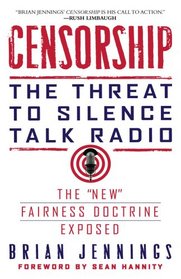Very Important Ideas, but Presentation has issuesâ¦
The book explains what the Fairness Doctrine was and then illustrates the ways that the progressive majority in the federal government might try to bring back the fairness doctrine under different names, e.g. localism & diversity, and through more subversive means.
For those who are unfamiliar, the Fairness Doctrine was an unconstitutional law put into place by the FCC under the presidential administration of FDR. The basic idea of the doctrine was that there should be equal time for all viewpoints. The idea was promoted as a way to ensure equity in the media and in an age in which there were only a handful of radio stations, three television networks, and the idea of the Internet was still a figment of the imagination it seemed like a good idea. In actuality, the doctrine was used by FDR to silence his critics. FDR was notorious for doing everything in his power and sometimes even outside of his power to eliminate the voices of those who opposed him (perhaps something he learned from his good friend Joseph Stalin). The Fairness Doctrine was one such example. Just on principle, the idea is unconstitutional, but even more disturbing is how the doctrine was brought about not by Congress itself, but by the FCC. Anyway, the only reason that radio still exists today is because of the elimination of the Fairness Doctrine in 1987 by President Reagan and Congress.
Over twenty-years later, there is now a movement, largely led by progressive Democrats, to re-introduce the Fairness Doctrine or at least stifle voices of opposition but through using different terms and new names that equate to the same thing. In all fairness, this is something that any American who supports the Constitution should be against. Free speech is free speech and even if you disagree with what someone says, no one has a right to take away that person's right to say it.
I'm not sure why progressives seem so adamant upon "changing" radio. Statistically, conservative talk radio only makes up a fraction of radio listeners. Yet, if you listen to the rhetoric in Congress it would seem that conservative radio talk show hosts hold much more power than they really have.
Anyway, CENSORSHIP is a book that I would like to recommend to people to read because of the very important issues it addresses. However, as a single piece of writing, CENSORSHIP has issues. The chapters of the book read better as individual essays instead of a united whole. When read together in a short time it feels like the author keeps repeating himselfâ¦. I understand the reasoning for this and such a technique can make for a great speech or presentation but it makes for incredibly frustrating reading.





